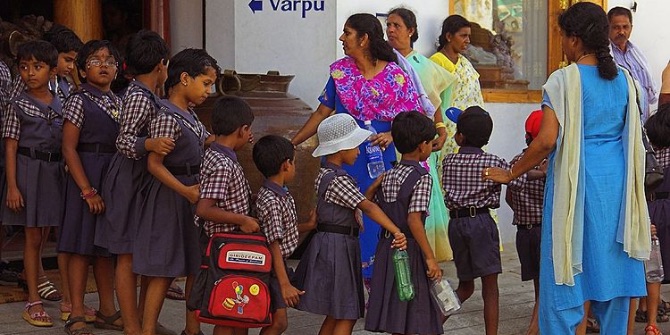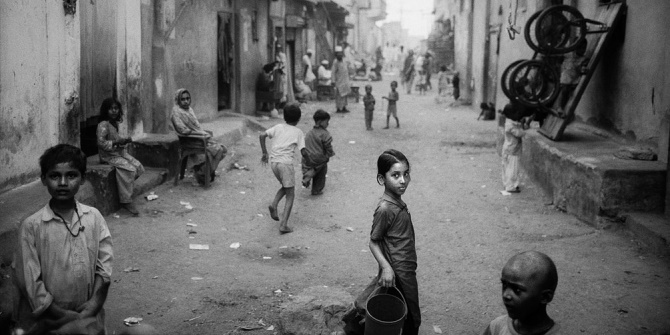Taneesha Mohan describes the socio-political context for gendered labour relations in contemporary India drawing on case studies from Tamil Nadu and West Bengal.
The existence of tied labour is a result of complex forms of labour arrangements forged out of interlocking transactions and gendered ‘unfreedoms’ occurring within the overarching structure of agrarian capitalism. Interlocking transactions consist of institutions of social control and structures of power and privilege that are important for the mobilisation as well as maintenance of a constant supply of labour power. These interlocking transactions are not curtailed or conditioned by factors of economic advancement and backwardness. Rather, they operate over land, labour and credit markets creating varying degrees of unfreedoms and types of tied labour. Through my comparative work on Tamil Nadu and West Bengal, I try to uncover how and why labour tying arrangements persist to date, through various forms of interaction between labour, land and credit.
Most studies on Tamil Nadu and West Bengal show a decline in bonded labour. However, a decline in bonded labour does not necessarily mean a decline in exploitative working conditions, gendered unfreedom or labour tying. It is inherent in capitalism to create unfreedom in order to control and manage labour. Moreover, rural labour relations are not an outcome of a simple sale of labour power. Instead they are forged out of social conflict and tensions, oppressive modes of social behaviour and structures of power and privilege. It is therefore important to look beyond economic reasons and into everyday power-laden practices that conjure up coercive mechanisms to bind female labour in agriculture.
Labourers entering into labour tying arrangements are one of the many forms under which the production process in agriculture is organised. Unfree labour arrangements tend to focus only on monetised forms of bondage, such as loans, advance and debt. In fact, one of the leading forms of control is through the generation of debt. Jan Breman talks of unfreedom in terms of indebtedness, which creates what he refers to as neo-bondage. Unfreedom is seen as a loss of freedom of movement upon the payment of earnest income. The relations of debt do not need to be in the form of an advance. Social control meted out in the form of dependence of the labouring class upon the employer leads to the creation of a fearful and insecure labour force. Moreover, labour control is governed through social control of cooperation, dominance and exploitation, which manifests itself in different power-laden social and political structures. This is an important tool for the rural elite to marshal and maintain their positions.
In India, the agrestic subordination of one class over the other persists. Indeed, such relations have been accentuated with the onset of capitalist development within agriculture—even though technology is a fundamental part of modern agriculture, the social relations of production and various power relations continue.
These constitute interlocking transactions that sustain the indomitable presence of social and political institutions that shape agrarian relations and form distinct ‘classes of labour’. In the case of the female labouring class it becomes necessary to understand the ways in which the employer, under these interlocking transactions, makes full use of gendered relations and women’s indebtedness. My research moves beyond the dichotomy of free and unfree labour, in turn broadening the concept of unfreedom and indebtedness.
The post-liberalisation era in India witnessed different forms of adoptions and adaptations to reducing government expenditure. Tamil Nadu and West Bengal have dominated in paddy production in India, however, the different political regimes and differences in the social status of the women in these two regions will affect the nature of the contracts and the potential for resistance amongst female workers. Tamil Nadu has a regional populist government (Dravida Munnetra Kazhagam and the All India Anna DMK), while West Bengal has recently seen the rise of the populist Trinamool Congress following 34 years of Communist Party of India-Marxist rule. The distinct political power structures have implications on the form and types of labour processes, control and coercive mechanisms, the terms and conditions of work, and intra-household relations and agency.
Moreover, both states historically have recorded instances of bonded labour – the panniyal in Tamil Nadu and the bandha kishen in West Bengal – and also have strong workers’ union presence (the Agricultural Workers Union in Tamil Nadu and the Krishak Sabha in West Bengal). As such, there is a deep-seated nexus between the economic, political and social institutions that perpetuates labour tying within agriculture.
These conditions raise several questions that my ongoing research attempts to address: Within the agrarian system, how are different forms of labour tying arrangements created? How do these labour tying arrangements result in the ‘classes of labour’ being tied to land, employer and credit systems? Within this web of unfreedom, how do interlocking power relations encroach upon social and political structures to maintain and create various labour tying arrangements? To what extent are women in particular able to negotiate within such labour tying arrangements? Answers to these questions have great implications for the future of labour in India.
Taneesha Mohan is a PhD student at LSE’s Department of Geography and Environment and the Tata PhD Fellow at the Asia Research Centre.








